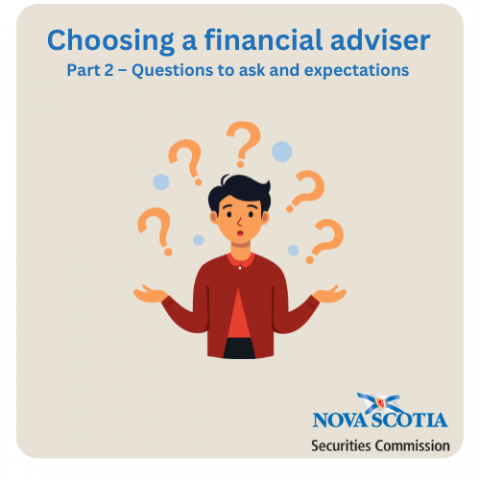Submitted by nsscadmin on

Last week we began our short blog series on choosing a financial adviser by looking at why you might want to work with a financial adviser in the first place. We conclude this week by looking at questions to ask a prospective adviser and expectations you should and should not have when entering a client-adviser relationship. Let’s start with the questions:
- Are they registered?
In Canada, anyone trading securities or in the business of advising clients on securities must be registered with their provincial or territorial securities regulator. It is essential to make sure anyone you are doing business with, or you will be putting in a position to manage your money, is registered. Securities regulators, such as the NSSC, will only register firms and individuals that are qualified and have passed the necessary courses and met the other requirements for registration.
- What is their background and/or education?
What kind of education or training do they have? How many years of experience do they have in the industry? How many clients do they have? Have they ever been sanctioned or had any disciplinary action against them from a regulator? This background and history not only gives you piece of mind about who you are dealing with, but also helps you decide if they are the right fit for you and your goals.
- How are they paid?
When you're working with an adviser you will be paying them. There are several different ways advisers are paid, including by salary, commission, flat fees, or possibly a combination of these options. Find out how an adviser is paid and how much it will cost you to do business with them.
- What products and services do they offer?
An adviser can only offer you the products or services that are available at the firm they work for. This is important to know going in so you can be sure the products you are interested in will be available to you. For example, if you are simply interested in mutual funds a mutual funds salesperson working for a mutual fund dealer would be all you need. However, if you also want to invest in stocks, you will need a portfolio manager or an investment dealer.
- What level of service can you expect?
This is a good question to ask to ensure the expectations you have will be met by your adviser? If you simply want regular statements and an annual check-in, all advisers should be able to provide that. However, if you want more frequent contact or updates, make sure this is adequately communicated before you become a client of an adviser.
This final question leads to the topic of expectations. What should you expect from your adviser and what should you not expect from them?
Some things you should expect include:
- They follow know your client obligations.
- They make clear and specific recommendations.
- They explain the reasons behind their recommendations.
- The points of both strength and weakness of their recommendations.
- They outline all risks involved in all investment options.
Some things you should NOT expect include:
- They can predict the performance of markets with certainty.
- They guarantee investments will always be profitable.
- They act on vague or general instructions to buy or sell investments.
- You or they set unrealistic goals or expectations of profit.
When choosing an adviser take the time to find the right one for you. Asking for recommendations from family and friends can be helpful, but just because an adviser works well for someone else does not mean they are always right for you. Put in the work to find someone you can work with and trust with your money.
